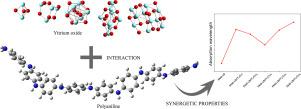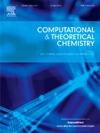Molecular design and characterization of the PANI/yttrium oxide multifunctional nanocomposite material
IF 3
3区 化学
Q3 CHEMISTRY, PHYSICAL
引用次数: 0
Abstract
A detailed density functional theory study was conducted on the nanocomposites formed by polyaniline and yttrium oxide clusters, employing the mixed 6-311G(d,p)/LANL2DZ basis set. The investigation identified the formation of the nanocomposites through strong covalent bonding and moderate electrostatic interactions, resulting in significant binding energies. These interactions contributed to a reduction in the band gap, increased electron activity, and higher chemical reactivity compared to pure polyaniline. The formation of the nanocomposites induced a redshift in the UV–vis absorption spectra, moving the maximum absorption wavelength from the ultraviolet to the visible region, indicating n-type doping. Natural bond orbital analysis confirmed the role of yttrium oxide clusters as electron acceptors, with polyaniline serving as an electron donor.

PANI/yttium oxide 多功能纳米复合材料的分子设计与表征
利用 6-311G(d,p)/LANL2DZ 混合基集对聚苯胺和氧化钇簇合物形成的纳米复合材料进行了详细的密度泛函理论研究。研究发现,纳米复合材料是通过强共价键和中等静电相互作用形成的,从而产生了显著的结合能。与纯聚苯胺相比,这些相互作用降低了带隙,增加了电子活性,提高了化学反应活性。纳米复合材料的形成引起了紫外-可见吸收光谱的重移,最大吸收波长从紫外区移到了可见区,这表明了 n 型掺杂。自然键轨道分析证实了氧化钇团簇作为电子受体的作用,而聚苯胺则是电子供体。
本文章由计算机程序翻译,如有差异,请以英文原文为准。
求助全文
约1分钟内获得全文
求助全文
来源期刊

Computational and Theoretical Chemistry
CHEMISTRY, PHYSICAL-
CiteScore
4.20
自引率
10.70%
发文量
331
审稿时长
31 days
期刊介绍:
Computational and Theoretical Chemistry publishes high quality, original reports of significance in computational and theoretical chemistry including those that deal with problems of structure, properties, energetics, weak interactions, reaction mechanisms, catalysis, and reaction rates involving atoms, molecules, clusters, surfaces, and bulk matter.
 求助内容:
求助内容: 应助结果提醒方式:
应助结果提醒方式:


